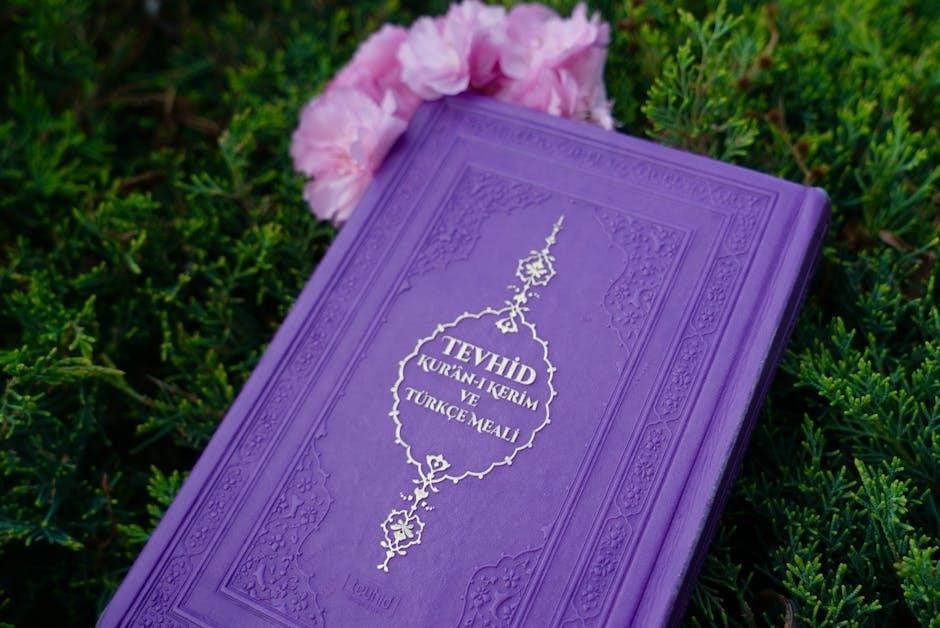Mastering the 400 most common words in the Quran is essential for understanding its teachings. These words form the foundation of the text, appearing frequently across various chapters. Learning them enhances comprehension, enabling readers to grasp key themes and messages. This focused approach simplifies study, making the Quran more accessible for deeper spiritual connection and practical application.
Importance of Learning Common Quranic Words
Learning the 400 most common words in the Quran is fundamental for grasping its teachings. These words are the building blocks of the text, recurring frequently across chapters. By mastering them, readers gain clarity in understanding key themes, such as worship, mercy, and guidance. This knowledge enhances spiritual connection, enabling deeper reflection on Quranic messages. It also simplifies study, making the Quran more accessible for personal growth and daily application. Understanding these words empowers learners to engage meaningfully with the scripture, fostering a stronger bond with its wisdom and divine lessons. This foundation is essential for both spiritual enrichment and practical application of Quranic principles in everyday life.
Overview of the Quran’s Linguistic Structure
The Quran’s linguistic structure is uniquely designed for clarity and impact. It employs a repetitive use of the 400 most common words, ensuring core themes like mercy, guidance, and worship are emphasized. These words form the backbone of its message, appearing in various contexts to reinforce spiritual and moral lessons. The Quran’s language is poetic yet profound, with a rhythmic flow that aids memorization and reflection. Its use of Arabic root systems allows for layered meanings, enriching understanding. This structure not only conveys divine wisdom but also creates a sense of familiarity, making the text accessible across generations. The interplay of repetition and linguistic precision ensures the Quran’s teachings remain timeless and universally relevant.
Significance of the 400 Most Common Words
The 400 most common words in the Quran hold profound significance, forming the essence of its message. They encapsulate core themes, ensuring understanding of divine guidance, mercy, and worship.

Role in Understanding Quranic Themes

The 400 most common words in the Quran play a pivotal role in unraveling its central themes, such as mercy, justice, and divine guidance. These words frequently appear in verses discussing faith, worship, and moral conduct, forming the backbone of Quranic narratives. By mastering these terms, readers gain clarity on recurring concepts like prayer, charity, and righteousness. They also illuminate the Quran’s emphasis on human relationships, societal harmony, and the pursuit of spiritual growth. Understanding these words bridges the gap between the text and its application, fostering a deeper connection with the divine message. This foundation enhances the ability to interpret and reflect on the Quran’s timeless wisdom, making its teachings more accessible and relatable.

Spiritual and Practical Benefits
Mastery of the 400 most common Quranic words offers profound spiritual and practical benefits. Spiritually, it deepens one’s connection to the divine text, facilitating a clearer understanding of Allah’s message. This clarity enhances prayer and recitation, allowing believers to engage more meaningfully with the Quran. Practically, these words form the backbone of everyday Arabic, aiding in comprehension of Islamic texts and sermons. The ability to recognize and understand these high-frequency terms makes the Quran more accessible, fostering a stronger bond with its teachings. This knowledge also bridges cultural and linguistic gaps, enabling Muslims to appreciate the richness of the Quran’s language. Ultimately, mastering these words enriches both personal faith and daily spiritual practices, making the Quran a living guide for believers worldwide.

Linguistic and Cultural Insights
The 400 most common Quranic words reveal the linguistic richness of Arabic and the cultural depth of the Quran. These terms reflect timeless spiritual themes and values, connecting believers across generations and cultures.
Arabic Language Basics
Understanding the basics of the Arabic language is crucial for grasping the Quran’s message. Arabic is a Semitic language with a unique root system, where most words derive from three-letter roots. This structure allows for rich word formation and nuanced meanings. The Quranic vocabulary, including the 400 most common words, reflects this linguistic richness. Arabic grammar and syntax are designed to convey precise meanings, emphasizing clarity and depth; Studying these basics helps learners appreciate the textual beauty of the Quran. Mastery of common words enhances comprehension of themes, while the language’s cultural and spiritual context deepens the reader’s connection to the text.
Cultural Context of Quranic Vocabulary
The cultural context of Quranic vocabulary is deeply intertwined with its linguistic structure and spiritual significance. The 400 most common words reflect the societal norms, beliefs, and values of the time, providing insights into the cultural framework of the Arabic-speaking world. These words often carry historical and religious connotations, shaped by the experiences of the Prophet Muhammad (peace be upon him) and the early Muslim community. Understanding this cultural backdrop enriches the interpretation of Quranic themes, such as justice, compassion, and faith. The use of parables and storytelling in the Quran, for instance, highlights the importance of relatable narratives in conveying divine messages. This cultural context not only aids in comprehension but also fosters a deeper connection to the text’s timeless wisdom and universal principles.

Learning Strategies
Effective strategies include memorization techniques, consistent practice, and using digital tools. Flashcards and apps can enhance retention, while group study fosters engagement and deeper understanding of Quranic vocabulary.
Effective Methods for Memorization
Memorizing the 400 most common Quranic words can be achieved through structured techniques. Repetition is key; recite words daily, using flashcards or apps to track progress. Group study enhances engagement, while setting specific goals helps maintain consistency. Incorporate mnemonic devices to associate words with meanings or contexts. Utilize digital tools like apps or quizzes to make learning interactive. Create a study schedule, dedicating time each day to review and reflect. Active recall, testing oneself without aids, reinforces memory retention. Exploring root words and patterns in Arabic enhances understanding and memorization. Consistency and patience are vital; celebrating small milestones motivates continued effort. Combining these methods ensures effective and lasting mastery of the vocabulary.
Using Flashcards and Digital Tools
Flashcards and digital tools are invaluable for memorizing the 400 most common Quranic words. Apps like Anki or Quizlet allow users to create customizable flashcards, enabling spaced repetition for optimal retention. Interactive features, such as audio pronunciation guides and quizzes, enhance engagement. Digital tools also offer tracking progress, setting reminders, and accessing pre-made decks. Many apps specialize in Quranic vocabulary, providing definitions, example verses, and cultural context. Additionally, online platforms offer printable flashcards for offline study. These resources cater to diverse learning styles, ensuring a dynamic and effective memorization process. By leveraging technology, learners can efficiently master the vocabulary, reinforcing their understanding of the Quran’s core teachings.
Resources for Study
Various study guides and PDFs are available online, offering detailed lists and explanations of the 400 most common Quranic words. These resources provide comprehensive support for learners.
Recommended PDFs and Study Guides
Several recommended PDFs and study guides are available online, specifically designed to help learners master the 400 most common words in the Quran. These resources often include comprehensive lists of words, their meanings, and contextual examples. Many guides also provide exercises and quizzes to test understanding. Some popular options are available on academic and religious websites, offering detailed explanations and linguistic insights. These materials are invaluable for both beginners and advanced learners, as they simplify complex concepts and enhance retention. Additionally, some guides incorporate audio pronunciations and flashcard systems, making learning interactive and engaging. By utilizing these tools, students can deepen their grasp of Quranic vocabulary effectively.
Supplementary Materials for Deeper Understanding
Supplementary materials, such as detailed commentaries, audio resources, and video lectures, complement the study of the 400 most common Quranic words. These tools provide contextual insights, helping learners understand how these words are used in various verses. Audio resources, for instance, aid in proper pronunciation and intonation, while video lectures by scholars offer deeper linguistic and theological explanations. Additionally, mobile apps and online platforms provide interactive learning experiences, such as quizzes and progress tracking. For those seeking a more immersive approach, joining online forums or study groups can foster discussion and shared learning. These materials enrich the learning process, making it more engaging and comprehensive for those aiming to master Quranic vocabulary.
Mastery of the 400 most common Quranic words provides a solid foundation for understanding the Quran’s themes and spiritual teachings. This knowledge enhances both comprehension and connection, fostering a deeper relationship with the text and its divine message.
Final Thoughts on Mastering Quranic Vocabulary
Mastering the 400 most common words in the Quran is a transformative journey that deepens understanding and spiritual connection. By focusing on these high-frequency terms, learners gain clarity into the Quran’s central themes and messages. This foundation not only simplifies further study but also enriches the reader’s ability to engage with the text meaningfully. As one progresses, the interplay of these words reveals the Quran’s linguistic beauty and profound wisdom. Memorization and consistent practice are key, but the ultimate reward is a lifelong relationship with the divine text. Embrace this journey with dedication, and let these words be the gateway to a deeper, more fulfilling comprehension of the Quran’s timeless guidance.
